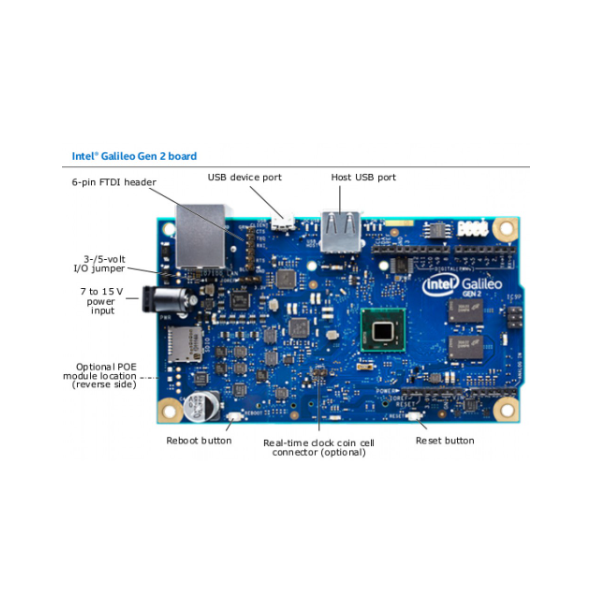Intel Galileo Gen 2
SKU
intel Gal-2
Brand Reward Points
0
₹6,499.00 ₹7,668.82
Out of Stock
Topic: Topic
The Intel® Galileo Gen 2 board is based on the Intel® Quark SoC X1000, a 32-bit Intel Pentium®-class system on a chip (SoC). It is the first board based on Intel® architecture designed to be hardware and software pin-compatible with shields designed for the Arduino Uno R3.
The Galileo board is also software-compatible with the Arduino Software Development Environment, which makes getting started a snap.
In addition to Arduino hardware and software compatibility, the Galileo board has several PC industry standard I/O ports and features to expand native usage and capabilities beyond the Arduino shield ecosystem. A full sized mini-PCI Express slot, 100Mb Ethernet port, Micro-SD slot, USB TTL UART header, USB Host port, USB Client Port, and 8 MByte NOR flash come standard on the board.
The genuine Intel processor and surrounding native I/O capabilities of the SoC provides for a fully featured offering for both the maker community and students alike. It will also be useful to professional developers who are looking for a simple and cost effective development environment to the more complex Intel® Atom™ processor and Intel® Core™ processor-based designs.
Note: The Galileo does NOT come with a USB microB cable, this will need to be purchased separately.
Includes:
1x Intel® Galileo Gen 2 Board
1x “Universal” 5V Wall Wart
Features:
Intel® Quark™ SoC X1000 application processor, a 32-bit, single-core, single-thread, Intel® Pentium® processor instruction set architecture (ISA)-compatible, operating at speeds up to 400 MHz.
Support for a wide range of industry standard I/O interfaces, including a full-sized mini-PCI Express slot, 100 Mb Ethernet port, microSD slot, USB host port, and USB client port.
256 MB DDR3, 512 kb embedded SRAM, 8 MB NOR Flash, and 8 kb EEPROM standard on the board, plus support for microSD card up to 32 GB.
Hardware and pin compatibility with a wide range of Arduino Uno R3 shields.
Programmable through the Arduino integrated development environment (IDE) that is supported on Microsoft Windows, Mac OS, and Linux host operating systems.
Support for Yocto 1.4 Poky Linux release.
Write Your Own Review




